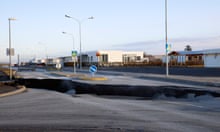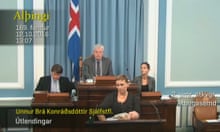Iceland’s incumbent Independence party was in pole position to try to form a new government after voters chose continuity in Saturday’s elections and support for the anti-establishment Pirate party, while sharply up, fell below early expectations.
The Pirates, founded four years ago by a group of activists, anarchists and former hackers, tripled their share of the vote to 14.5%, and together with an alliance of three left-of-centre parties won a total of 27 seats – five short of a majority in the country’s 63-seat parliament.
The centre-right Independence party, however, won almost 30% of the vote and a total of 29 seats with its coalition partner of the past three years, the Progressive party, which was badly hit by this year’s Panama papers scandal and lost more than half its MPs.
In a campaign whose early stages were dominated by public anger at Iceland’s traditional elites and a strong desire for political change, the Independence party promised to lower taxes and keep Iceland’s economic recovery on track.
“I cannot deny that … it would be natural that we are a leading party in the next government,” said the party’s leader, Bjarni Benediktsson, one of its 21 MPs. “We are gaining new seats in parliament, so we are very happy.”
The final shape of the government is far from clear, with multiple permutations possible, much horse-trading ahead and disagreement even on which party should be the first to attempt to form a new government. Benediktsson said he expected President Gudni Johannesson to hand his party the mandate to begin negotiations, since it was the largest. He added that he would prefer to form a three-party coalition, but declined to say with whom.
But the Pirates, too, said they would be looking to build a five-party coalition, including the newly established, liberal and pro-European Viðreisn (Regeneration) party, whose seven MPs could well prove the kingmakers in Iceland’s new administration.
“Epic success! There are a lot of coalition possibilities; lots of work ahead,” tweeted Smari McCarthy, one of the Pirates’ 10 MPs.
Of the Pirates’ allies, the Left-Green movement also picked up 10 seats, the Social Democrats three, and the centrist Bright Future four. The party has ruled out working with the two outgoing coalition members.
With 30 female MPs, Iceland has now leapfrogged Finland and Sweden to become the parliament with the highest proportion of female parliamentarians – more than 47% – in Europe.
The Pirates, riding a wave of public anger at what many voters saw as endemic political corruption laid bare by the 2008 financial crash and April’s Panama papers leaks, had been predicted to win up to 20% of the vote and even become Iceland’s largest party.
But the party’s co-founder, Birgitta Jónsdóttir, an activist, poet and former WikiLeaks collaborator, said it was more than satisfied. “Our internal predictions showed 10% to 15%, so this is at the top of the range,” she said. “We are a platform for young people, for progressive people who shape and reshape our society.”

Some of the party’s younger voters, though, were upset. “I’m really sad,” said Bylgja Gudjonsdottir, a 22-year-old student. “This is our next generation that is taking the country to the next level. But they keep voting for the criminals we have here.”
Opponents argued that the Pirates could scare investors and derail an economy still recovering from the 2008 meltdown, when Iceland’s three main banks collapsed owing 11 times the country’s GDP, and the value of the krona halved.
Helped by a tourism boom – 2.4 million visitors, nearly seven times the country’s population, are expected in 2017 – economic growth is forecast to reach 4.3% this year, and unemployment has fallen to just over 3%.
The Pirates campaigned for direct democracy, government transparency, individual freedoms and the fight against corruption. The party also favours decriminalising drugs, offering asylum to whistleblowers such as Edward Snowden, and relaxing restrictions on the use of the virtual currency bitcoin.
The election was triggered by the resignation of the former Progressive party prime minister, Sigmundur Davið Gunnlaugsson, who became the first major casualty of the Panama papers in April after the leaked legal documents revealed he and his wife had millions stashed offshore.
The revelations sparked outrage and some of the largest protests in Iceland’s history, forcing the government to replace Gunnlaugsson with the then agriculture and fisheries minister, Sigurður Ingi Jóhannsson, and promise fresh elections before the end of the year. Jóhannsson resigned on Sunday, paving the way for the formation of a new government.
More than 600 Icelanders – including cabinet ministers, bankers and business leaders – were shown to have holdings hidden in offshore accounts.










